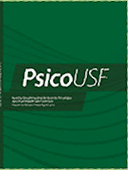Psico-USF
Abbreviation:
Psico-USF
Published by:
Graduate Program in Psychology at Universidade São Francisco
Publisher Location: Itatiba, Brazil
Journal Website:
https://www.scielo.br/j/pusf/grid
Range of citations in the SafetyLit database:
2005; 10(1) --
2023; 28(2)
Publication Date Range:
--
Number of articles from this journal included in the SafetyLit database:
18
(Download all articles from this journal in CSV format.)
pISSN = 1413-8271 | eISSN = 2175-3563
Find a library that holds this journal: http://worldcat.org/issn/14138271
Journal Language(s):
English, some summaries in Portuguese and Spanish
Aims and Scope (from publisher):
Psico-USF is a journal that seeks to promote the discussion on scientific production in the field of Psychology. Our publications are multidisciplinary, focusing on psychological processes, psychological assessment, instrument construction and validation, behavioral processes, neuropsychology, psychotherapy, and other relevant areas to one or more aspects of psychology. Manuscripts of a strictly theoretical nature are not accepted. The purpose of the journal is to serve as a forum for the presentation and dissemination of current research in the field of Psychology and as a vehicle for knowledge dissemination for researchers, professionals, and others interested in the field.
The Psico-USF is published twice a year by the Graduate Program in Psychology Stricto Sensu of the Universidade São Francisco, in Itatiba, Brazil. First named as Klinica and Revista das Faculdades Franciscanas is published since 1974 and in 1996 was renamed to Psico-USF.
Original papers in English, Spanish and Portuguese reporting studies in areas related to Psychology will be considered for publication, including basic, experimental, applied, ethnographic and historical studies, as well as theoretical articles, policy analyses and systematic syntheses of research. Critical reviews of books, diagnostic instruments and software are also welcome.
Since the selection of articles is based on blind peer review, the ideas reflected in the articles do not necessarily reflect the position, opinion, or philosophy of the Graduate Program, nor of the University of São Francisco.
